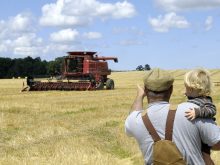Education has changed since I was a kid, several million years ago.
I exaggerate, a little, but one does feel old when faced with the fresh ideas and aspirations of today’s high school students, especially those involved in innovative new programs.
I’ve bumped into several new teaching methods over the last few years, but this latest one has some extras going for it.
I refer to the bioresource management program at Evan Hardy Collegiate in Saskatoon, which uses a problem-solving model to engage young people in real-world issues.
Read Also

Crop profitability looks grim in new outlook
With grain prices depressed, returns per acre are looking dismal on all the major crops with some significantly worse than others.
The students are grouped together to produce case studies on a variety of bioresource-related topics. The premise of one of these studies, at the Grade 11 level, is that students consider themselves to be agrologists who will present a paper at an agricultural conference on current best practices for sustainable land use of managed mono-crop agricultural systems.
The students’ initial reaction is huh? Then they get into the process, talk to experts, go on field trips, and finally, they totally get it.
The program is so popular that Hardy added a Grade 12 level after the first year.
Teachers Sarah Clark and Tina Rioux will welcome 40 students next fall as they start the third year of the program, more than double the 18 they started with.
One of this year’s students is Niall Cubbon, an excellent example of the impact this course is having.
Niall has some agricultural background, but considers himself a mainly urban product. He originally thought he would go into engineering, but has since decided to attend the University of Saskatchewan’s College of Agriculture and Bioresources. Really, how cool is that?
Because of the Hardy program, Niall realized he was “more interested in the biology side than the math side” – a good thing to discover before one gets to university.
Sarah and Tina welcomed sponsors of the program to a breakfast celebration and program explanation June 10. The innovative nature of the program was clear, but an added attraction is the crossing of the urban-rural divide.
Bioresource management is going to be increasingly important to the future of prairie farmers. This program, and graduates like Niall, contribute to that future.














